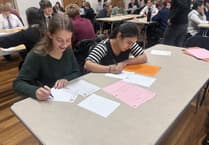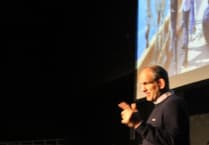Love, acceptance, respect and safety, are all values which most of us try to live our lives by. But at Totnes Independent School, these are the cornerstone of how the school educates its students. As the school celebrates its 10th anniversary, these values are still at the forefront of staff and student’s minds, as they prepare to move onto the next stages of education and life.
The school has a unique approach to education. No homework, non-punitive discipline, no uniform and students are on first name basis with their teachers. Aaron Griffin went to speak some of their students and the headteacher, Simon Bowley.
Finn, student, 14, spoke of how important the schools ethos is and the environment it creates for students: “I think my favourite thing is LARS.
“And it's the buzzword, isn't it? It's kind of the thing that everyone says. But, it creates such a welcoming community. I think it's such a good ethos and principle to have any institution running around.
“And I don't think it exclusively has to be for the school and for children and adult interactions. I think it's a really good way to just live life and experience interactions with everyone you encounter.”
Simon opened by talking about why he was attracted to the school originally: “Well we started as a very small school, three years before I joined the school, and there was a vision by our founder, proprietor, Ross Robins, for a school that pursued academic progress and excellence, but also looked after young people, without the rigours of things like homework, or we don't have a punitive system, we use restorative practices as opposed to detentions and things like that.
“We're still a very small school, and as the students pointed out, the thing that for me that remains important, even though we've grown, and even though there's that success of being here for 10 years, is the relationships that are at the heart of what we do. And actually the thing that I really liked when I was listening to Sophie, Ashton and Finn talk is the absence of stress about their GCSEs, because they're right in the middle of their GCSE studies at the moment, and it was interesting that they didn't talk about that, they didn't talk about how stressful the work was, which is probably a reflection of those relationships, and LARS as well I think.”
When asked about some the best achievements in its first ten years Simon spoke of his pride in the schools consistently excellent results: “I think the academic success that we have, given, we're doing it in a different way, basically. This is a different model for education. We're able to get great academic results, excellent progress, whilst developing young people who are happy, with minimal stress, and enjoy their school life.
“And we could have picked anyone to be honest, to talk to you, it really wouldn't have mattered. You could have gone into the playground and said, they probably would have said the same thing. So, I think that's something that I'm really proud of.
“And I've got a background in different schools. And you just don't see that stress in our students when they go through the exams. So, for them to succeed academically, whilst being happy and fulfilled and doing lots of other things in their life, is unusual.”
Sophie, student, 15, spoke about how important the supportive and encouraging atmosphere for school fosters is: “They also support achievements outside of school, which is again really important. So last year at South Road Saving, which is like junior lifeguard training, I got youth of the year, and it was put in the school news which I was really excited about.
“And it's really nice because it's important that the teachers also know the students instead of just teaching them.
“I think, love, acceptance, respect and safety is really, really important. And again, just encouraging everyone so much is definitely one of my favourite things.”
On the unique no homework policy Simon credited its success to the school’s small class sizes: “If you ask the students, they would say highly successful. Yes. I mean, the thing is, when you've got a small class, our classes are capped at 12. So, students can make great progress in lessons.
“So that one-to-one time that you get with the teacher, it just happens every lesson throughout the day. So, the progress is being made. Sometimes homework is used to enhance progress that's happened during the school day.
“We find that that progress happens in lessons. So, we don't need that homework. But also, it frees up the evening for young people to, you know, whether it's to intellectually be a little bit freer or to go and do activities.”
Ashton, 15, said that the support students are given has made the word of difference to him: “When I came here, my needs were instantly catered for and it just, that really boosted my confidence and I think that's why this school is just so great because it really does help just every single person's needs and because of the class sizes are so small as well, it just, the teacher can see across the whole classroom and just know when someone needs help, even if you don't put your hand up, you just instantly get, it's basically just one-to-one attention at all times and that is just amazing and so great.”
Similarly, no uniform in a secondary school is another unique feature of the school, Simon said: “So from my background in schools, there was always school uniform. There was always a staff dress code, which was reasonably strict.
“I, when I first moved here and when my, both of my children, my daughter went through the school here and is in university now. My sons in year 11 here and they both went to primary schools with no uniform. But a lot of their friends, when they first came here with no uniform, I think felt a little unusual, a little odd.
“But quickly just found they would just dress comfortably. You know, they just didn't really, we don't, to be honest, we don't really think about it. You know, we just want students to be as comfortable as possible.
“And usually that's just wearing what they want to wear, you know, rather than being restricted by a uniform. Every so often somebody says it would be quite nice to have a school uniform day. Yeah.
“Almost like the opposite of a non-school uniform day. But it's an interesting one because we don't really think about it because it's so normal. You know, they dress for school as they might at the weekend, just like I dress now as I would at the weekend.
“Because what I'm comfortable in. So maybe that, well, probably that is also something that contributes to them feeling quite comfortable in school.
“Because it is quite unusual, that's what I don't realise.”
Ashton also spoke of his future ambitions: “I love being outside and working outside, it's just, there's just something about being outside which just really makes me feel really happy so I'd probably want to be, I've looked into being a Dartmoor Ranger before or just being up on Dartmoor because that's where I feel alive and really passionate about that or an eco-role, doing something maybe in the council, doing something like finding ways we can solve issues and stuff in local communities. I've also thought about being a teacher as well because I would really love to help students, you know, really because I feel like a good teacher just really boosts everyone, you know, just to shape a life is incredible.”
Finn also spoke of his future ambitions: “So at the moment, I volunteer in a bookshop, Castle Books, for my DofE. So, I'm really enjoying that. And I think that's a really interesting thing to do.
“So, if I can, I'd like to continue pursuing kind of something around books. Obviously, as well, I'm interested in history. So, if I can go into kind of the academic side of that or, like, archival stuff, I'd be really interested in that.”





Comments
This article has no comments yet. Be the first to leave a comment.